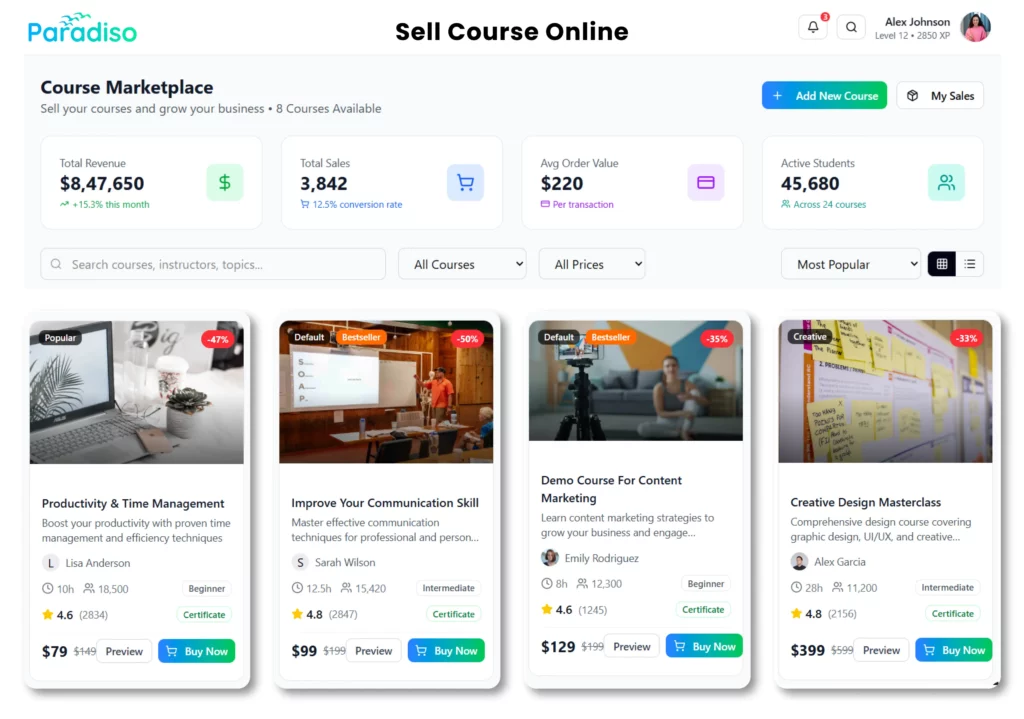There has been a significant rise in the number of coaching academies worldwide in recent years. These academies provide various coaching services, from academic tutoring to professional training, and have become popular for individuals seeking personalized coaching and guidance. With the rise in demand for coaching services, coaching academies increasingly turn to Learning Management System (LMS) platforms to manage their operations more efficiently.
An LMS platform is a software application that enables creating, managing and delivering educational content and courses. It provides a centralized platform for coaches to organize their coaching materials, communicate with their students, and track their progress. LMS platforms offer a variety of features, including course creation tools, assessment and grading functionalities, communication and collaboration tools, and analytics and reporting tools.
How to start an Online Academy?
Starting an online academy can be challenging, but it is a great way to share your knowledge and expertise with a broader audience. Below are a few steps to consider when starting an online academy:
- Define your niche and target audience: Before creating courses and content, it’s important to identify your niche and target audience. Determine the specific area of knowledge or expertise you want to share and the audience you want to reach.
- Develop a course plan: Once you have identified your niche and target audience, develop a course plan that outlines your course structure, curriculum, and learning outcomes. Determine the type of content you will create (e.g., video lectures, text-based content, interactive exercises), the duration of the course, and any prerequisites or requirements.
- Choose an LMS platform: Select one that meets your needs and budget. Research different options and compare their features, pricing, and user reviews. Some popular LMS platforms include Paradiso CourseCart, Moodle, Canvas, and Teachable.
- Create course content: Once you have chosen an LMS platform, create your course content. Develop high-quality content that engages your learners and meets the learning outcomes you identified in your course plan. Consider incorporating multimedia content (e.g., videos, images, interactive quizzes) to make the course more engaging.
- Set up your online Academy: Set up your online Academy on your chosen LMS platform. Create your course structure, upload your content, and configure your settings (e.g., course pricing, enrollment, and payment options).
- Market your online Academy: Once it is set up, marketing it to attract learners is important. Utilize social media, email marketing, and other advertising strategies to reach your target audience.
- Launch your courses: Once you have completed all the steps above, it’s time to launch your courses. Encourage learners to enroll in your courses and provide ongoing support and feedback to help them achieve their learning goals.
Top Benefits of Using LMS to Deliver Online Coaching Training
Running an online academy without an LMS platform can be challenging, as managing courses, assignments, grading, and communication with students can quickly become overwhelming. Here are some reasons why an LMS platform is important for running an online academy:
- Centralized course management: LMS platforms provide a single location for instructors to manage all aspects of course creation and delivery, making it easier to organize course materials and track student progress.
- Efficient communication: LMS platforms enable easy communication between instructors and students, allowing instructors to provide real-time course updates and students to ask questions and receive feedback more easily.
- Automated Grading: LMS platforms can automatically grade assignments and assessments, freeing up instructors’ time to focus on teaching and providing feedback.
- Personalized learning: LMS platforms offer personalized learning experiences, allowing students to learn at their own pace and according to their own needs.
- Enhanced student engagement: LMS platforms offer interactive and multimedia content, such as videos, quizzes, and gamification features, which can increase student motivation and learning outcomes.
- Detailed analytics: LMS platforms provide detailed analytics on student performance and engagement, enabling instructors to identify areas of strength and weakness in the course content and delivery.
- Scalability: LMS platforms can accommodate many students, making it easier to scale up an online academy as it grows.
Final Thoughts:
An LMS platform like Paradiso CourseCart can be beneficial for running an online coaching academy. With its range of features, including easy course creation and management, automated grading, and engaging learning experiences, an platform can help instructors provide a high-quality learning experience for students while streamlining administrative tasks.














